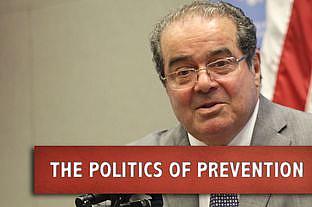SCOTUS Won't Intervene in Texas Abortion Case
Following the U.S. Supreme Court’s decision on Tuesday not to intervene in Texas’ ongoing abortion litigation, Planned Parenthood and other abortion providers are working to secure access to the procedure for women across the state.
This story is part of an ongoing series that 2013 Dennis A. Hunt Fund for Health Journalism Grantee and National Health Journalism Fellow Becca Aaronson will write for the Texas Tribune on women's health care in the state. For a complete look at Aaronson's extensive coverage, click here.

Photo by: Eric Bridiers
U.S. Supreme Court justices on Tuesday rejected a request by abortion providers to intervene in their lawsuit challenging the constitutionality of new abortion regulations in Texas that took effect in November.
"Reasonable minds can perhaps disagree about whether the [U.S. 5th Circuit] Court of Appeals should have granted a stay in this case," Justice Antonin Scalia wrote in the 5-4 opinion. "There is no doubt that the applicants have not carried their heavy burden of showing that doing so was a clear violation of accepted legal standards — which do not include a special 'status quo' standard for laws affecting abortion."
In a dissenting opinion, Justice Stephen Breyer wrote, "Although the injunction will ultimately be reinstated if the law is indeed invalid, the harms to the individual women whose rights it restricts while it remains in effect will be permanent."
He added: "The underlying legal question — whether the new Texas statute is constitutional — is a difficult question. It is a question, I believe, that at least four members of this court will wish to consider irrespective of the 5th Circuit's ultimate decision."
The 5th Circuit has a hearing scheduled in January to consider the lawsuit, which will proceed as planned.
Gubernatorial candidate and state Sen. Wendy Davis, D-Fort Worth, whose 11-hour filibuster of the proposed regulations pushed her into the national spotlight, has also weighed in on the Supreme Court's decision: "Clinics will close and women's health will be hurt because of this law. This is an abuse of power by politicians in Austin. I trust women to make their own decisions and will continue to work to make sure that women and mothers are safe and have access to adequate health care."
On Oct. 31, a three-judge panel in the 5th Circuit lifted an injunction by a lower federal court that targeted two provisions in House Bill 2: one that required abortion providers to obtain admitting privileges at a hospital nearby the facility, and one that requires abortion providers to follow federal guidelines — rather than a common, evidence-based protocol — when administering drug-induced abortions.
The plaintiffs, who represent the majority of abortion providers in Texas, including four Planned Parenthood affiliates, Whole Woman’s Health and other independent abortion providers, filed a lawsuit in September seeking an injunction on the two provisions. They have argued that the provisions are unconstitutional because they place an undue burden on women attempting to access the procedure. They also say a third of the state’s abortion facilities would be forced to stop performing abortions if the regulations took effect, resulting in 22,000 women losing access to abortion services. Abortion rights advocates report that 14 facilities in Texas have discontinued services as a result of the new law.
“The shattering stories of women turned away at clinic doors and denied their constitutional right to abortion are already numerous, and they multiply every single day this underhanded law is enforced," Nancy Northup, president and chief executive of the Center for Reproductive Rights, said in a statement.
Proponents of the new regulations say they will help the state protect women from unsafe abortion procedures.
“These are commonsense — and perfectly constitutional — regulations that further the state’s interest in protecting the health and safety of Texas women," Lauren Bean, a spokeswoman for the Texas attorney general's office, said in a statement. "And we are pleased that the U.S. Supreme Court has ruled that HB 2 will remain in effect.”
The attorney general’s office has argued that the provisions do not create an undue burden and advance the state’s interest in protecting life. Abortion opponents also emphasized in a “friend of the court” legal brief that they were able to schedule abortion procedures within a week at 14 abortion facilities in Texas. They argued that proves abortion facilities in Texas still have adequate capacity to serve Texas women and that the new regulations have not created an undue burden on women attempting to access the procedure.
This article was originally published in The Texas Tribune.
Photo Credit:Eric Bridiers

